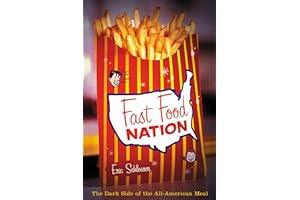Summary
Fast Food Nation delves into the history and inner workings of the fast food industry in America, exposing its less-than-desirable practices and effects on society. Author Eric Schlosser takes a critical look at how the fast food industry has shaped America’s culture, economy, and food system, highlighting the dark and often hidden consequences of fast food consumption. Drawing from extensive research and firsthand interviews, Schlosser presents a thought-provoking and eye-opening portrayal of the fast food industry and its impact on both individuals and society as a whole.
Book Genre
Non-fiction, investigative journalism
Main Topic
The fast food industry in America and its negative effects on society, from worker exploitation and food safety concerns to its role in contributing to the obesity epidemic and damaging our environment.
Key Ideas
- The rise and dominance of the fast food industry in America and its impact on society.
- The unethical and harmful practices of the fast food industry, including worker exploitation and disregard for food safety.
- The effects of fast food on individuals and society, such as contributing to health problems and destroying local economies.
- The role of government and corporations in perpetuating the fast food industry and its consequences.
Main Parts of the Book and Short Summary
- Part One: “The American Way” – Examines the history and rise of the fast food industry in America, its impact on the country’s culture, and its influence on other nations.
- Part Two: “Meat and Potatoes” – Focuses on the meatpacking industry and its connection to fast food, revealing the harsh working conditions and health risks faced by workers.
- Part Three: “Behind the Counter” – Explores the working conditions and practices of fast food restaurants, including the exploitation of teenage workers and the disregard for food safety.
- Part Four: “Success” – Looks at the success and influence of fast food corporations on the economy, politics, and global food system.
- Part Five: “Why the Fries Taste Good” – Investigates the artificial flavors used in fast food and their health effects.
- Part Six: “On the Range” – Examines the damage caused by the fast food industry to the environment and local economies.
- Part Seven: “Cogs in the Great Machine” – Explores the lives of immigrant workers, who make up a large portion of the fast food industry.
- Epilogue: “Have It Your Way” – Reflects on America’s love-hate relationship with fast food and suggests ways to bring about change.
Key Takeaways
- The fast food industry has had a damaging impact on the American culture, economy, and food system.
- Fast food corporations prioritize profit over the well-being of their workers and consumers.
- The fast food industry is a major contributor to the obesity epidemic and other health problems in America.
- Government policies and practices have allowed the fast food industry to thrive and evade accountability for its negative effects.
- There is a need for conscious consumerism and government efforts to address the issues within the fast food industry.
Author’s Background and Qualifications
Eric Schlosser is an American investigative journalist and author. He has written for publications such as The Atlantic, Rolling Stone, and The New Yorker. Schlosser has also received numerous awards for his investigative journalism, including the National Magazine Award. With Fast Food Nation, he conducted extensive research and interviewed a variety of individuals in the fast food industry, as well as experts in related fields, to gather the information and stories presented in the book.
Target Audience
Fast Food Nation is a must-read for anyone who is interested in understanding the inner workings of the fast food industry, its impact on society, and the consequences of consuming fast food. It is also relevant to those looking to make informed food choices and promote advocacy for workers’ rights and a more sustainable food system.
Publisher and First Publication Date
Fast Food Nation: The Dark Side of the All-American Meal was published by Houghton Mifflin in 2001.

